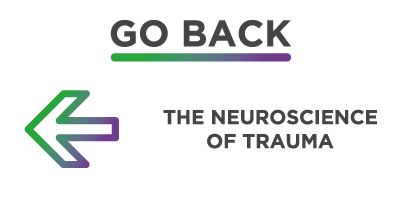Our self-experience is the product of the balance between our rational and emotional brains. When these two systems are in balance, we feel “normal”. When our survival is at stake, these systems can function relatively independently creating a tug-of-war. This war involves deep inward feelings in our gut, heart, and lungs and can lead to both physical and psychological discomfort and pain.
After trauma, the survivor’s energy becomes focused on suppressing inner chaos, at the expense of spontaneous involvement in their life. These attempts to maintain control over unbearable physiological reactions can result in a whole range of physical symptoms and autoimmune disorders including fibromyalgia, chronic fatigue, celiac disease, diabetes, Graves’ disease, inflammatory bowel disease, multiple sclerosis, psoriasis, rheumatoid arthritis, and systemic lupus erythematosus. In autoimmune diseases, the body starts attacking itself: an immune system oversensitive to threat is prone to mount a defence when none is needed, even when this means attacking the body’s own cells.
We experience our most devastating emotions as gut-wrenching feelings and heartbreak. If we register emotions primarily in our heads, we can remain pretty much in control, but feeling as if our chest is caving in or we’ve been punched in the gut is unbearable. We’ll do anything to make these awful deep inward sensations go away, whether it is clinging desperately to another human being, rendering ourselves insensible with drugs or alcohol, or taking a knife to our own skin to replace overwhelming emotions with definable sensations. Many mental health problems, from drug addiction to self-injurious behaviour, start as attempts to cope with the unbearable physical pain of emotions.
The most important job of our brain is to ensure our survival. To do this, our brains need to: generate internal signals that register what our bodies need; create a map of the world to point us where to go to satisfy those needs; generate the necessary energy and actions to get us there; warn us of dangers and opportunities along the way; adjust our actions based on the requirements of the moment. We are mammals and can only survive and thrive in groups, so all these necessities require coordination and collaboration. Psychological problems occur when our internal signals don’t work when our maps don’t lead us where we need to go, when we are too paralysed to move, when our actions do not correspond to our needs, or when our relationships break down.
Dissociation is the essence of trauma: overwhelming experience is split off and fragmented, so that the emotions, sounds, images, thoughts, and physical sensations related to the trauma take on a life of their own. The sensory fragments of memory intrude into the present, where they are re-lived. People may not be aware of the connection between their feelings and reactions and the traumatic events that are being replayed. They may have no idea why they respond to some minor irritation as if they were about to be attacked. Flashbacks can be worse than the trauma itself: a traumatic event has a beginning and an end, at some point it is over, but a flashback can occur at any time, and there is no way of knowing when it’s going to occur again or how long it will last.
When elements of trauma are replayed again and again, the accompanying stress hormones engrave those memories ever more deeply in the brain. Day-to-day events become less interesting and it becomes difficult to feel the joys and aggravations of life and concentrate on tasks. These reactions are largely outside the control of survivors and they are rarely in touch with the origins of their isolation. Hence, shame can become the dominant emotion and hiding the truth an obsession.
Not all people react to trauma in the same way. Depersonalisation (blank stare, absent mind) is one symptom of the dissociation created by trauma. With nearly every part of their brains tuned out, some people cannot think, feel, remember, or make sense of what is going on. In the most severe cases, dissociation can lead to psychosis and experiencing hallucinations (sensory experiences that occur without an external stimulus, like voices and visions) or delusions (beliefs maintained despite being contradicted by reality, like paranoid thoughts). The more isolated and unprotected a person feels, the more death will seem like the only escape: suicide attempts and high-risk behaviours (smoking, obesity, unintended pregnancies, multiple sexual partners, and sexually transmitted diseases) are common amongst people struggling with to cope with the effects of trauma and “mental illness”.
I offer a free initial telephone conversation, giving you as much time and space as you need to consider whether you’d like to come and meet me.






